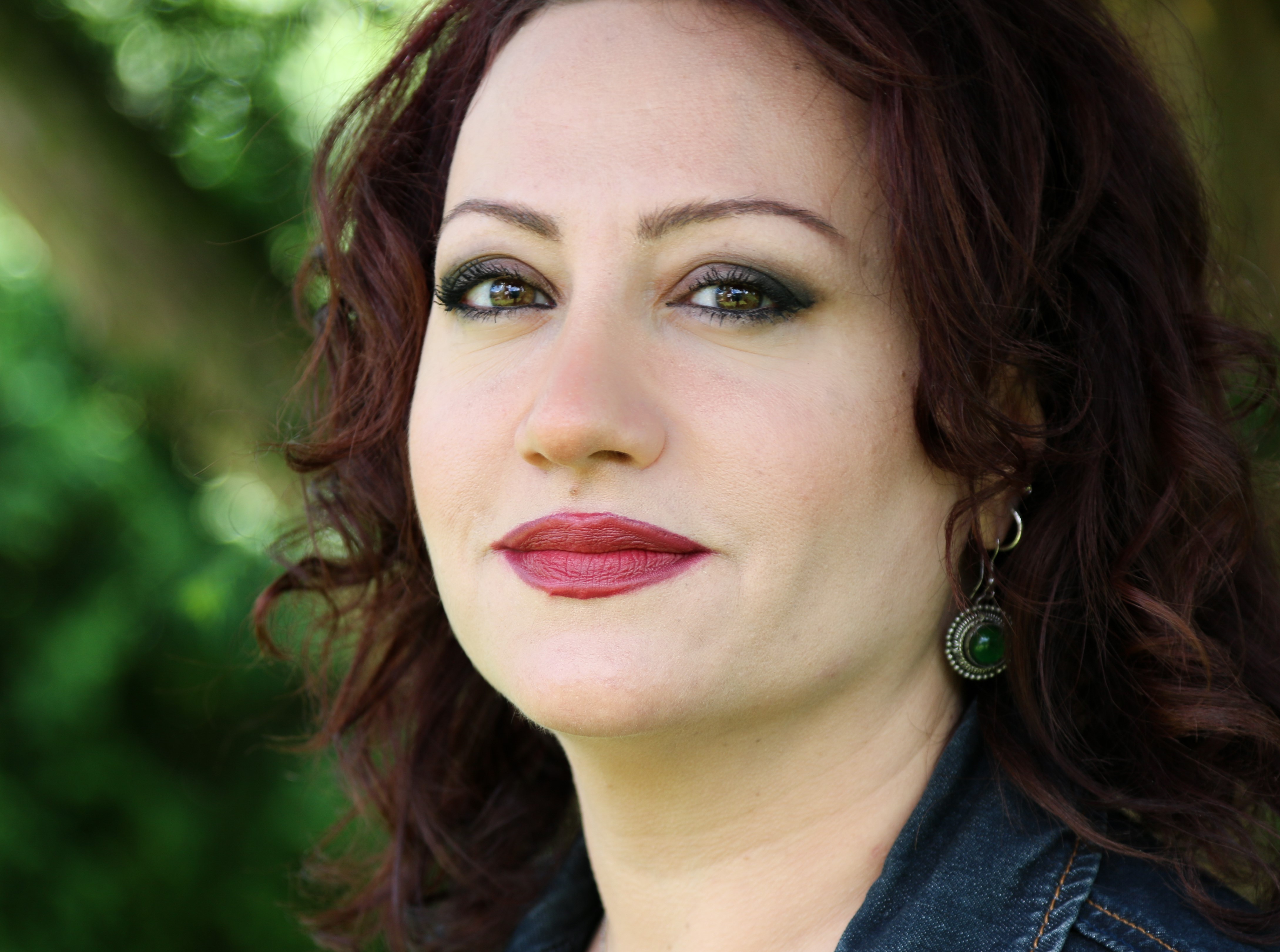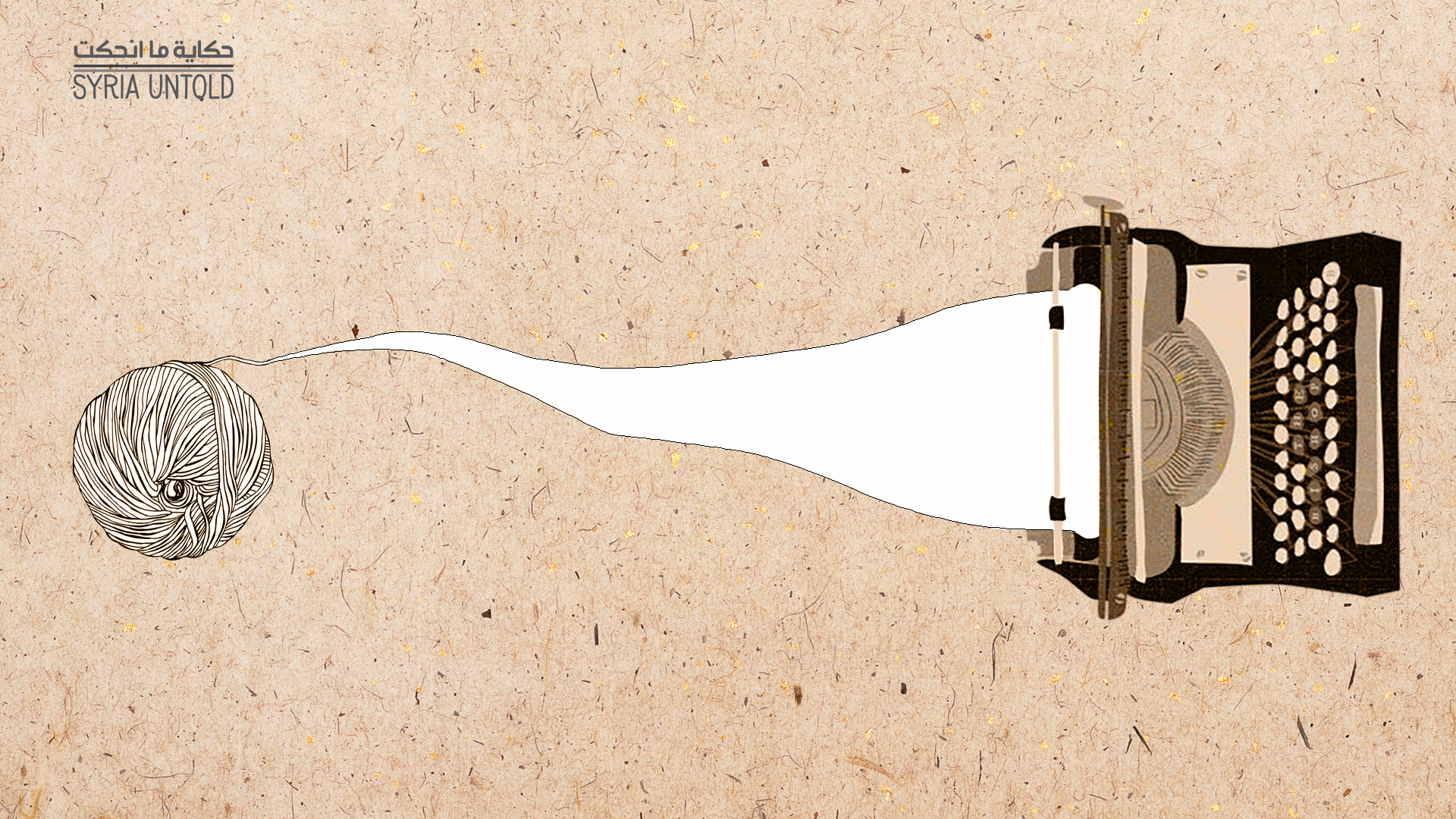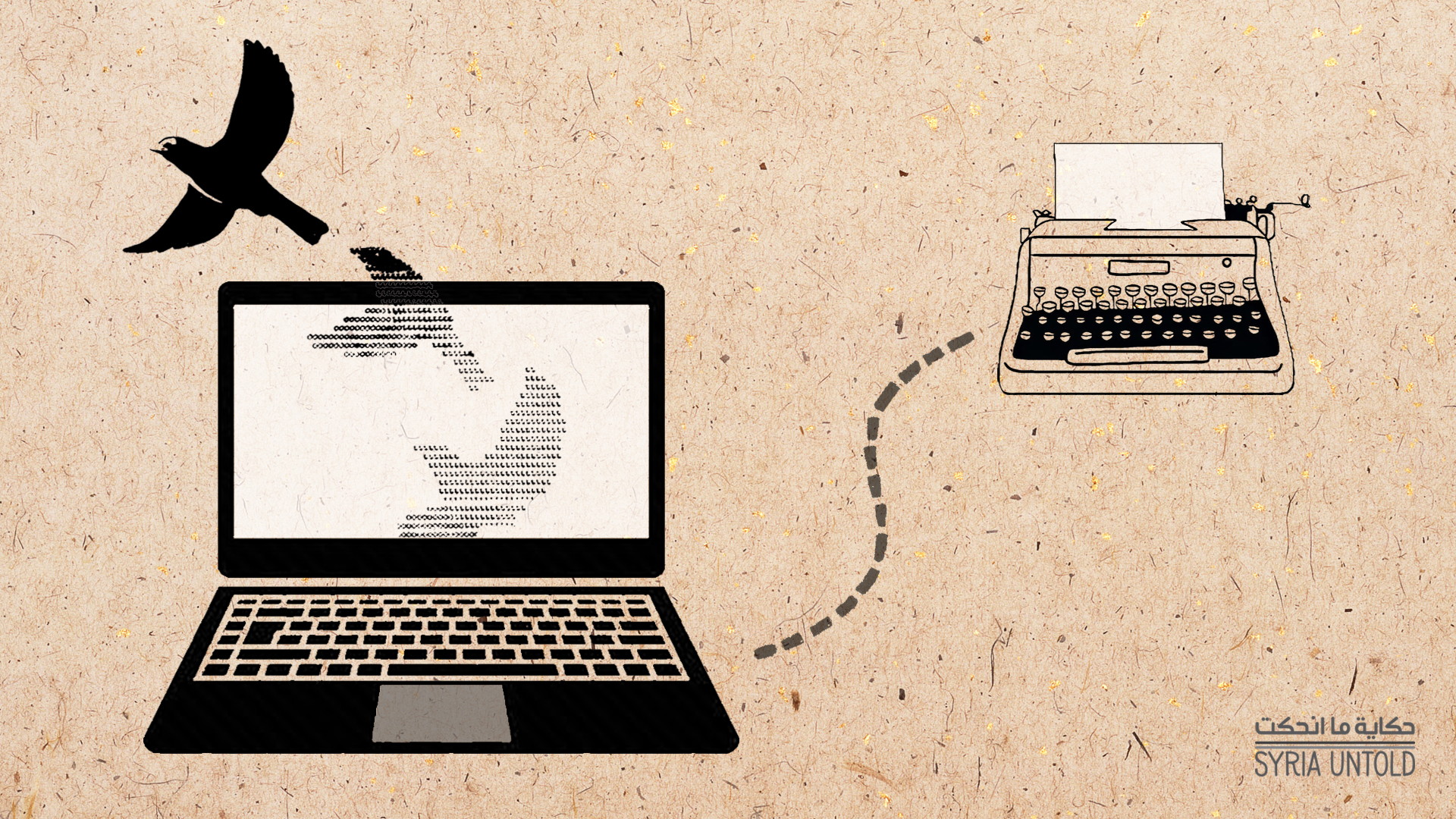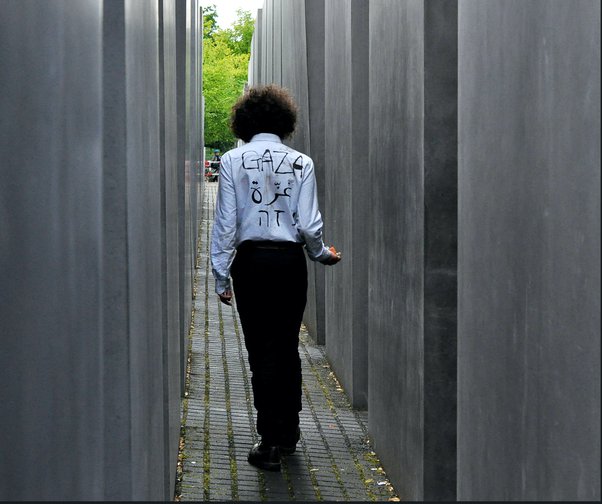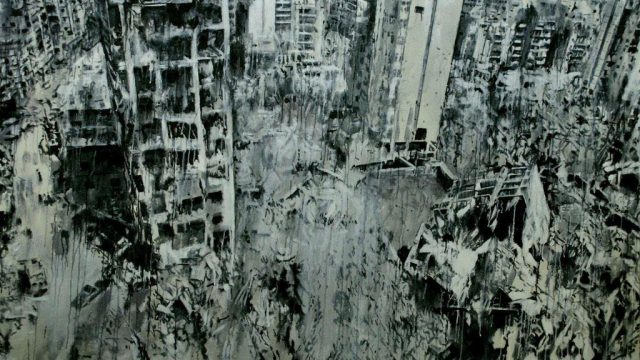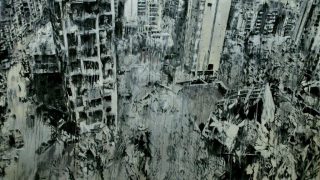This article is part of a series on shifting narratives in Syrian literature, guest edited by Syrian novelist Rosa Yassin Hassan. Read this article in Arabic here.
Seeing creativity in the eyes of others is perhaps one of the main landmarks in the history of narratives in general, and the Syrian narrative in particular. Witnessing the impact and peculiarity of creativity through its reflections on the other, and the ways it is received, is one of the most important tests that has contributed to deepening the recent and general changes in the Syrian narrative.
The other, or the recipient, whether a translator, reader or publishing house, has become a real and actual companion in the writing journey, for better or for worse. In other words, they might impact the narration deepening process through their awareness of aesthetics we did not see before, and by seeing details whose importance we were not aware of. This would be a positive effect. But they might also tend to redefine axioms and alter creativity to suit the other’s taste and deep-seated rules, and this is among the most serious negative effects on creativity.
Writing in the familiar creative environment, both locally and in the Arab world, certainly produces narratives packed with peculiarities, but such writings have yet to face experimental shocks that can be boiled down to the vision and judgments of the other. I discussed this idea, among others, with the two German translators and scholars Larissa Bandar and Stephan Milich, and asked them about the change that has affected Syrian narratives, in their eyes.
Reality, documentation and trauma
Milich has worked extensively on aspects of trauma, whether bruises or psychological trauma, in Arab narratives both before and after the Arab revolutions. His research on the topic gave him the certainty that writing about trauma has in recent years gained impetus in Arab narratives in general, and Syrian narratives in particular. Both female and male writers have come to acquire a detailed knowledge of the trauma, and their tackling of the subject has become more profound and deep-seated, perhaps because it has become an essential part of their own personal experiences and the experiences of those around them. The theoretical knowledge of trauma has become more widespread, and courage, as opposed to the previous reluctance, has become central when tackling the topic.
Questions about growing change in Syrian narratives
12 January 2021
Signs of modernism in the Syrian novel
19 January 2021
“But does the theoretical knowledge of trauma infer real creative work related to it in texts?” I asked.
Milich explained: “In Palestinian narratives, for example, which I have worked on for a long time, there are real, implicit and deep works on trauma rather than direct and explicit works—perhaps because of the Palestinian writers’ extensive experience in the repercussions of collective trauma, which is deeply rooted in their consciousness and perhaps subconsciousness. Therefore, Syrian writers will need time to understand the depth of the trauma within them and within their societies, and to develop coping mechanisms. All major shocks need time to take shape and to be internalized and processed by humans.”
For her part, Bandar said: “Maybe we can compare trauma in Syrian literature with trauma in German literature, rather than Palestinian literature. What happened in Germany during and after World War II is one of the biggest human disasters, and it is still written about today. According to new social psychological research, trauma may be passed on from one generation to the next, and the longer the time, the deeper the depth of its understanding and analysis. In the 1990’s, for example, a new wave emerged in Germany of female and male writers, grandchildren who wrote about the period of Nazism. The older generation started to fade, and there were consequently no more witnesses to the tragedy. But the narrative had to go on, and the grandchildren of that generation tackled the topic from a different point of view and a different angle. It is quite an enriching journey because the longer the time, the wider the angle. In my opinion, this will certainly happen to Syrian narratives, in one way or another.”
Exile, and the reality of writing in exile
According to Bandar, exile was the primary condition that deepened the change which affected—and is yet to affect—the Syrian narrative. The revolution has certainly contributed to the act of change, but not as much as exile. Unfortunately, those who stayed in Syria did not see their political conditions change much, unlike those who fled into exile and experienced a wide transformation in their political and social conditions. There is a large, if not enormous, body of recently published Syrian literature, and many of the female and male writers had never published before. Syrian literature, or the literature of “Syrian refugees,” enjoys massive support and a general welcoming atmosphere, according to Bandar, thus encouraging an increase in the number of writers and published texts.
“Syrian writers’ familiarity with European literature, the German one more particularly, plays a big role. Over here, they do not write under political pressure and fear. Rather, they tackle what they could not write before. Chief among these examples is what female and male writers, especially the youth, began to write freely in exile on the Hama massacres, among other massacres witnessed in Syria,” Bandar added.
“The phenomenon of writing in exile is obviously new,” Milich said. “Although exile literature is old, writing in exile is different now due to the different times and diverse political, cultural and social circumstances. Europeans are deeply interested in the politics of the Middle East, in asylum and immigration, among other things, and readers look for political and cultural components and are eager for Middle Eastern literature—although the creative standard is what should be primarily considered.”
"The older generation started to fade, and there were consequently no more witnesses to the tragedy. But the narrative had to go on, and the grandchildren of that generation tackled the topic from a different point of view and a different angle. It is quite an enriching journey because the longer the time, the wider the angle. In my opinion, this will certainly happen to Syrian narratives, in one way or another." -Larissa Bandar
“Do you mean that the large body of Syrian literature published in exile comes at the expense of quality?” I asked him.
“Either way, it is a positive phenomenon, although this quantity will be at the expense of quality,” Milich answered.
“Time can filter out bad texts,” he went on. “Talking about quality is not quite easy, but there is a set of criteria that is fundamental. What are the criteria used to assess texts currently published in exile? There are real effects on today’s Arab and Syrian book market in Germany. The book market is not free. It is often affected by marketing strategies, publishing house whims, personal relationships, and other factors that influence the spread of books and their consequent successes or failures. Yet Syrian literature has spread widely compared to the period preceding the Arab Spring revolutions. Syrian literature was previously sort of negligible. Adonis was probably the most famous [Syrian] poet in Germany, and there were no other famous Syrian writers. Things have taken a different turn today. Most importantly, interest in Arabic and Syrian literature has grown widely.”
Bandar commented: “Syrian literature received more acceptance because the Syrian plight made it to the German media outlets. Therefore, the matter is somehow political. In my opinion, literature is not merely a pleasure. It is required to tell readers about a world and society they do not know. Literature brings people closer and helps them better understand each other.”
I repeated my question: “Do you think this quantity came at the expense of the quality?”
“The large body of published literature is always a positive thing because writing and expressing one’s experience, trauma and history, etc. is positive, in general,” Bandar replied.
Raqqa, at the center of the universe
16 August 2020
She continued: “Time will sift through good texts. Time alone will determine who will keep writing and who won’t. I don't like to judge the quality of texts. After all, every text has its fans and readers. There is a market for every type of text. There might be some drawbacks because some of the support that a number of new writers have received will create unrealistic hopes for them. The problem is that publishing houses control the choice of texts and writers. We used to laugh at the prejudices Arab writers and books faced, with their covers portraying veiled women, where talk about a free Arab woman was an exception. There were ridiculous prejudices. Today I sense a real change in the whims of publishing houses, as they have become more open to others.”
Narration and writing
As we discussed the narrative changes in translated texts, both in terms of meaning and form, Milich proposed that the documentation element in narration has strengthened greatly in new narratives, especially those written in exile, given the strong need to register and document what happened and save it from oblivion. The unfolding events of the revolution, inside and then outside the country, the revolution itself, the war and asylum; all of these themes are fundamental, hence the desire to document them.
Milich added: “Because I believe that what writers produce comes from within, I cannot ask them to have a specific topic or style of writing, but I hope that they honor the question of heritage and historical identity in their writings and do not forget it under the influence of other questions. It is a very important question in defining the current identity. For example, the city of Palmyra has a dual identity: Palmyra the prison and Palmyra the prosperous civilization, and this was the result of the destruction committed by the Islamic State. I was surprised that Syrians do not think of these two times in the same location, where barbarism and civilization inhabit the same place.”
Bandar followed: “Topics have definitely changed based on the radical change of reality. Revolution texts started rolling out, and texts related to war, as in tragedy, followed suit. Before the revolution, anti-dictatorship texts certainly existed, but they were not so clear about the political situation. Five years following the biggest wave of asylum, Syrian writers, both female and male, started writing texts about exile. What I would call ‘literary integration’ surfaced, as Syrian writers wrote about the new society, its contradictions, differences, problems and homesickness or nostalgia. As far as language is concerned, and since translators work on the anatomy of texts just like doctors work on the anatomy of human bodies, we can pick up any small error or weakness in the language. The language of the new texts, in my opinion, has become full of errors and weaknesses, thus revealing hastiness in writing, compared to the texts written before. How I wish Syrian writers would not fall into the trap of clichés about Germans and Germany just, like they are asking Germans not to view Syrians and Syria as a cliché! Unfortunately, I have noticed this matter in some texts here and there.”
Peculiarity, universalism and Islamophobia
Asked what she was expecting of the new Syrian narratives, Bandar responded: “I am not asking anything of writers. I am just waiting to read about the Syrian reality and history, about many things that I do not know, as it is possible today to write freely.”
"The first mission of literature, if there ever is one, is to create new questions about the world." -Stephan Milich
She added: “Islamophobia is an old concept in Germany, but it ebbs and flows. In other words, prejudices about the Middle East in general started to change with the arrival of Syrian refugees to Germany, most of whom are Muslims. This changed the point of view of many Germans towards Islam. Literature changes many of our narrow and rotten opinions. But on the other hand, terrorist attacks throughout Europe have further entrenched Islamophobia and the rise of the extremist right-wing tide among the public. There is a funny incident that I recently read and loved because it explains a lot. A German father asks his son: Are there foreigners in the classroom with you? The child answers: No, we do not have foreigners, there are only children.”
Milich answered: “Although there are certain topics that are required of Arab writers in general, centering on political violence, dictatorship, terrorism, women's liberation and so on, writers must free themselves from all these expectations, maintain their peculiarity and focus on their story and on the world they want to create. At the end of the day, there is no doubt that writers write for others, but adopting other people's ideas for the purpose of marketing and disseminating [books] is bound to sabotage creativity without bringing any benefit to texts. Writers may earn money, but their texts wouldn’t be successful. The first mission of literature, if there ever is one, is to create new questions about the world, despite the fact that the influence of literature in general is limited as far as media outlets are concerned, for example. I wish to read Syrian writers who have deviated from the Syrian issue to tackle global issues. The political situation definitely affects the book market, but the Arab literature reader is generally an open reader. Therefore, the effect of Islamophobia on German readers of Arabic literature is not strong, and new generations have become more open to others. They learn with ‘foreigners’ in schools. For example, it is perfectly normal today for a [white] German child or teenager to have a non-German friend or a classmate of color. This is not how things were before. Absence of discrimination and tolerance of others is something that a person learns from childhood. The educational system will be of great importance in the coming days. The focus of Syrian female and male writers on children’s literature is very important, in my opinion, but I unfortunately do not notice much interest in it.”


